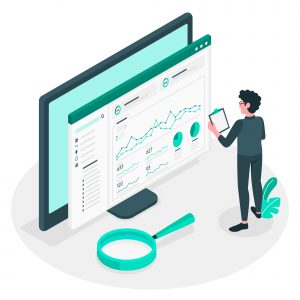
Data-driven vs Data-informed vs Data-inspired- an Ultimate Guide
These three buzzwords may feel like overkill, that too, in recent times, the word “data” is being annexed to almost anything and everything related to business. All these words have the almost same meaning but where they differentiate is in chronology and context. All these come under the data engineering bracket so it’s all about incorporating data into your process.
Leveraging data is a recent trend. Before the age of rapid digitalization, there were no data engineers or data analysts per se. Successful business persons attributed their success to their experience and their sharp intuition. They could have been naturally gifted data enthusiasts, but they always thought that their success is because of their intuition.
As the digital age began, people were more aware of the process. The business operations became transparent to the public and the magic is exposed. People understand the cause and effect now, and their trust for data grew rapidly during the early stages of digitalization.
Fascinatingly, this was the time where a lot of start-ups began to pop up on the map. People who based their vision on data rose to a greater position in no time. The foundation of Silicon Valley are people who valued data and incorporated a logical problem-solving mechanism.

It’s all about the approach…
Before we get into the differentiation of these terms, we have to understand something first. just because a decision is based on data doesn’t mean the outcome would be positive. It’s all contextual as these terms have evolved over a period of time.
The data-driven approach is the oldest term, followed by data-informed, and then data-inspired. It is undeniably true that the market is moving towards leveraging data for an overall enhancement of its operations. Data engineers, data scientists, data analysts, and a lot more started showing up and this created an excellent opportunity for businesses, enterprises, organizations, and even governments.
Data alone is not useful. The power of data lies in the function and again, the context. For example, let’s take the e-commerce giant Amazon’s case. Amazon is one of the few organizations that harvested the power of data quite early. It outgrew the e-commerce stage and is now the major B2B service provider with its AWS services.
Handpicked Related Content – How data-driven decisions help organization heads to fuel business growth?
To align its strategy from a bookselling portal to a tech-savvy organization is not a change that happens over a night. Also, raw data wouldn’t have been helpful here, as the movement of their organization towards the tech space requires a resilient and the sharpest risk management system. This begs the question- do experience and intuition overcome the power of data?
Well, yes and no. Even forming decisions based on a particular experience is nothing but a form of data analysis, even though the methods don’t seem to be so scientific. The drastic power change happens when you look at a model that is far bigger and is incomprehensible by the human mind.
In such situations, leveraging technology is the best-case scenario. Here, Data engineering solutions using technological innovations and prowess would provide outcomes that are far more accurate in a shorter period of time. Hence, all the rave about data!
How do you see your business?
You can see the business in two ways- scientific and unscientific way (for the lack of a better word). If you strip business to its bare bones, it is nothing but a series of decision-making. Running a business in the 21st century needs exemplary decision-making skills more than anything.
When you scientifically approach the business, your decision-making skills are backed by numbers, facts, figures, etc. Even in an unscientific approach, a decision is made based on certain facts, but the intensity of dependency on data is what makes these two methods differ. Implementing a data-driven culture in your organization can push your organization to the next level.
So, what’s a data-driven approach?
A data-driven approach uses just data as its only means of forming a decision. It doesn’t rely on the intuition or experience of the decision-making body. It takes the data available at hand way too seriously and aligns the operations accordingly.
This is probably the first type of data engineering type to enter the picture. Once businesses started to use technology to access and accumulate data, the number of options available for them to filter through increased exponentially. Hence, the popularity of the method.

What’s a data-informed approach?
This is a slightly updated version of the data-driven approach. the only difference is that this method works with contextual data rather than ‘raw’ data. The data-informed method questions the source of data. It applies more context to the existing model and understands the fact that a single sample confines the precision of the decisions made.
The decision-making body’s experience and intuition are added to the mix before forming a decision. This adds more sense to the data in hand and gives a bit clearer picture than completely relying on just data itself.
 What’s a data-inspired approach?
What’s a data-inspired approach?
Data inspired approach is not so much different from the data-informed method. The only difference is that here, the decision-making body is going to analyze various other data points and sources and then interpolate these results to form the final decision.
This is best suited for strategy, prescriptive, and predictive data analysis. This type of data leveraging helps you to understand the point towards which the whole system is traveling. If the current situations exist for another 5 years, where will your operations be then? Well, the data-inspired method is your best bet to nail that accuracy.
Concluding this,
You don’t have to be hung up on these methodologies too much! Consciously or unconsciously, Our decision-making process is influenced by our intuition and our past experiences. Leveraging technology to form the best decisions for your business will help you increase your precision by a great margin. Also, it can help you identify patterns that a normal human mind can sometimes fail to do so. Many business consultancies take this data game to a whole new level. The future will have more provisions to add context to the decision-making system, so fingers crossed!
